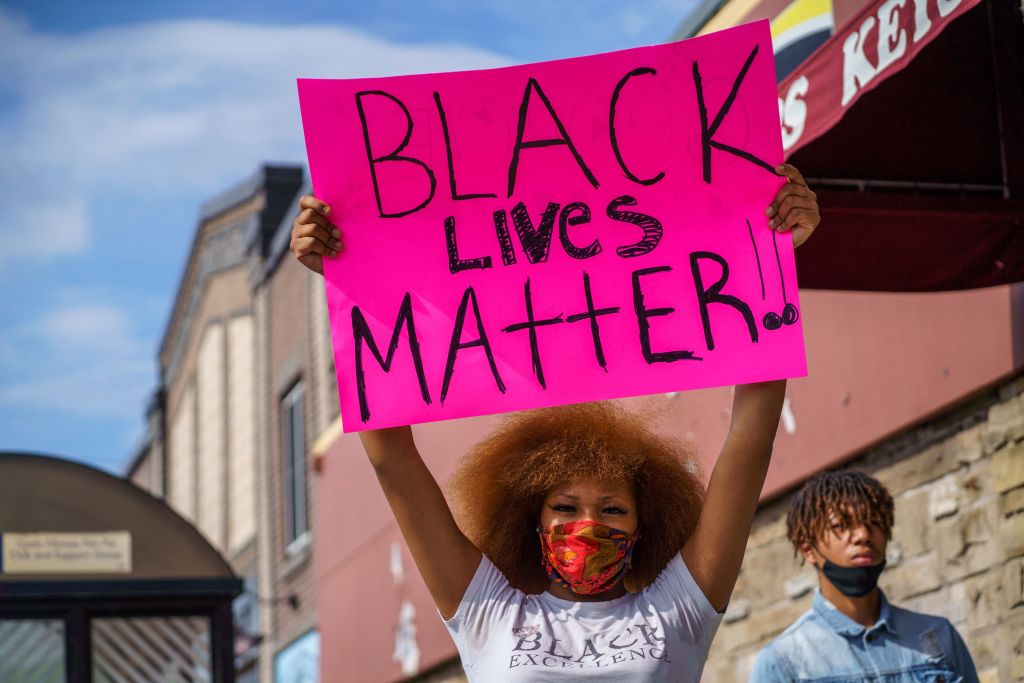
Source: KEREM YUCEL / Getty
As news that The United States Supreme Court overturned Roe vs. Wade, the landmark ruling decided in 1973 that gave those able to get pregnant the constitutional right to abortion, there have been nonstop conversations about what’s next. Black women, especially those of us who have assumed the fight for reproductive justice and bodily autonomy know the answer to the “what’s next” question all too well, and we are equal parts exhausted and irate. Black women have been demanding that this nation recognize our full humanity and autonomy since our foremothers arrived on this land in the bellies of slave ships. This fight for abortion access is but one part of our ongoing struggles to own and control our bodies– whether that struggle has been towards emancipation, a halt to forced sterilizations or the battle to end the kind of state surveillance that casts us as unfit mothers before our babies even leave our wombs.
I keep seeing references from too many white women, and even (surprisingly) some Black women, that fiction is becoming fact and that dystopian dramas like The Handmaiden’s Tale are becoming our collective reality. It’s insulting and infuriating really, that people can dismiss the real-life experiences of Black women in this country and instead compare the reversal of Roe to a damn television show. The ancestral blood that courses through my veins reminds me that I don’t have to imagine what life in this country might be like if I don’t have control over whether I birth children or not. I am also convinced, as a Black woman, that if I am forced to carry and give birth to a child that I may not be able to physically, financially, emotionally or mentally care for, I will receive little to no help from the lawmakers and judges who claim to be pro-life, and that if I struggle with a lack of sustainable food, clothing, and/or housing, myself and my child will be swept up into a family policing system that disproportionately harms Black families.
RELATED CONTENT: Black Women’s Bodies Is None Of Your Damn Business
When abortions are banned in many states across the U.S., like in my home state of Texas that has excitedly announced it will begin denying safe abortion access within 30 days of the Supreme Court’s recent decision, Black women will be disproportionately affected. According to Reuters, for instance, Black people make up 38 percent of Mississippi’s population (compared to 13 percent of the total U.S. population), and Black women accounted for 74 percent of the state’s abortions in 2019. What is even more devastating is that Black women who are forced to carry pregnancies to term may face a greater chance of dying in childbirth. Let’s not forget that we are three to four times more likely to die giving birth than white women. And although I believe that women should have access to safe abortions regardless of their reasons for seeking them, we must consider how many women will no longer be able to safely terminate pregnancies for medical reasons, which is defined as “when a pregnancy is ended due to a structural, genetic or chromosomal abnormality of the baby or when continuing the pregnancy would risk the health of mother.” In essence, The Supreme Court is forcing women (and doctors) to make decisions that are unimaginably dangerous and Black women may be in the most danger of all.
Losing access to safe abortions in several states will also cause economic hardships for many women who live barely above, at or below the poverty line. Many simply will not be able to afford travel and other costs associated with having an abortion performed outside of their city or state. Not to mention for us Black women, who already struggle to enter the (vanishing) middle class for a number of reasons (including little to no access to generational wealth transfer), an unwanted pregnancy could mean an end to our access to education and other determining factors that might help us escape poverty. The brilliant civil rights attorney and author of The New Jim Crow, Michelle Alexander admits in this opinion piece for The New York Times that she became pregnant after she was raped and that had she not been able to have a safe abortion she may have had to drop out of law school.
RELATED CONTENT: I Survived Rape And Illegal Abortion, Other Women Shouldn’t Have To Do The Same
To answer the question I mentioned above: what’s next is a fight, or rather a continuation of the fight we’ve been historically and collectively fighting since 1619. To start, let’s make sure that any rhetoric you offer online or elsewhere doesn’t only hold women accountable for preventing or terminating pregnancies. Sex is a human need and pleasure is a human right. Next, find and support local abortion funds. Make sure that you are aware of your state’s policies on abortion access, and also make sure that you are clear on what your plan might be if you find yourself in need of an abortion. Most importantly, be aware that this decision by The Supreme Court is not the beginning and will not be the end of our human rights being violated by the government. Let this moment radicalize you.
In the words of the brilliant thinker and writer Arundhati Roy, “We be many and they be few. They need us more than we need them… Another world is not only possible, she is on her way. On a quiet day, I can hear her breathing.”
RELATED CONTENT: PSALMS FOR BLACK GIRLS: My Daughters Should Know How Anti-Abortion Affected Their Grandmothers’ Lives, So I Told Them
Josie Pickens is an organizer, a writer, and a culture critic. Follow her on Twitter at @jonubian.









